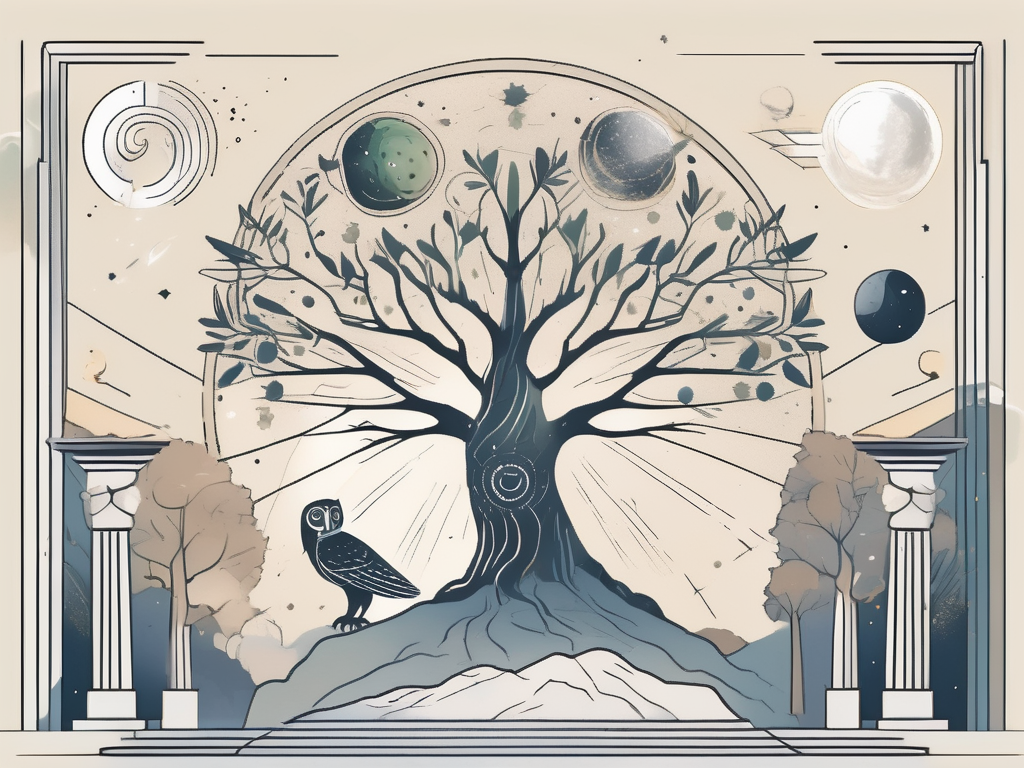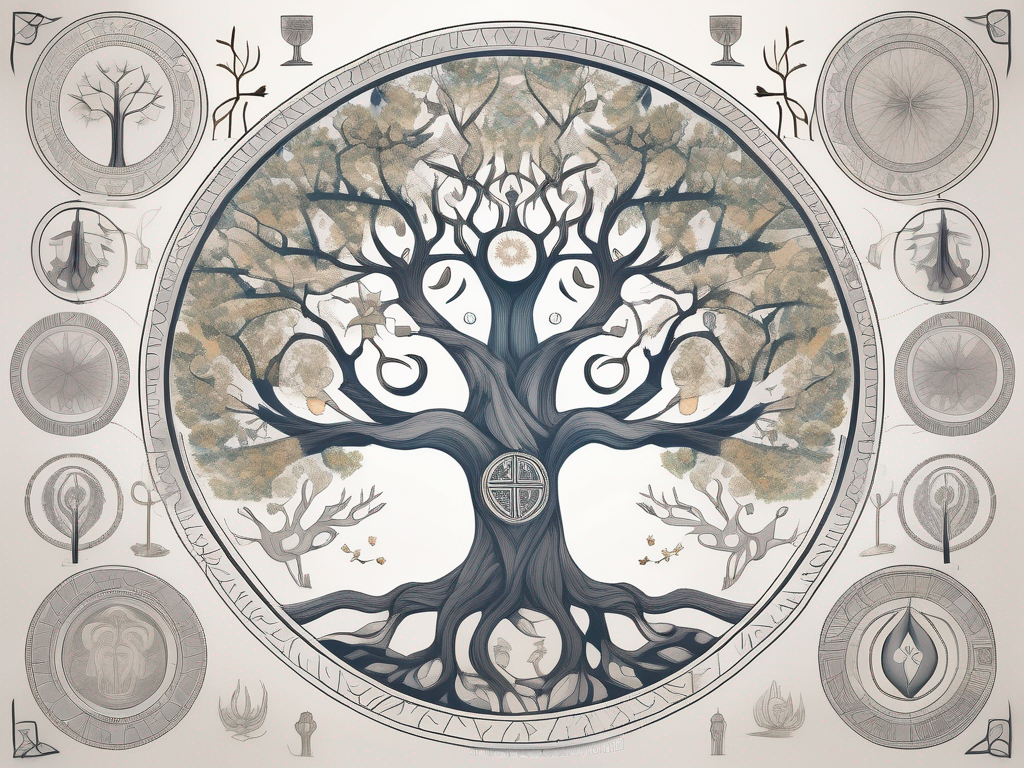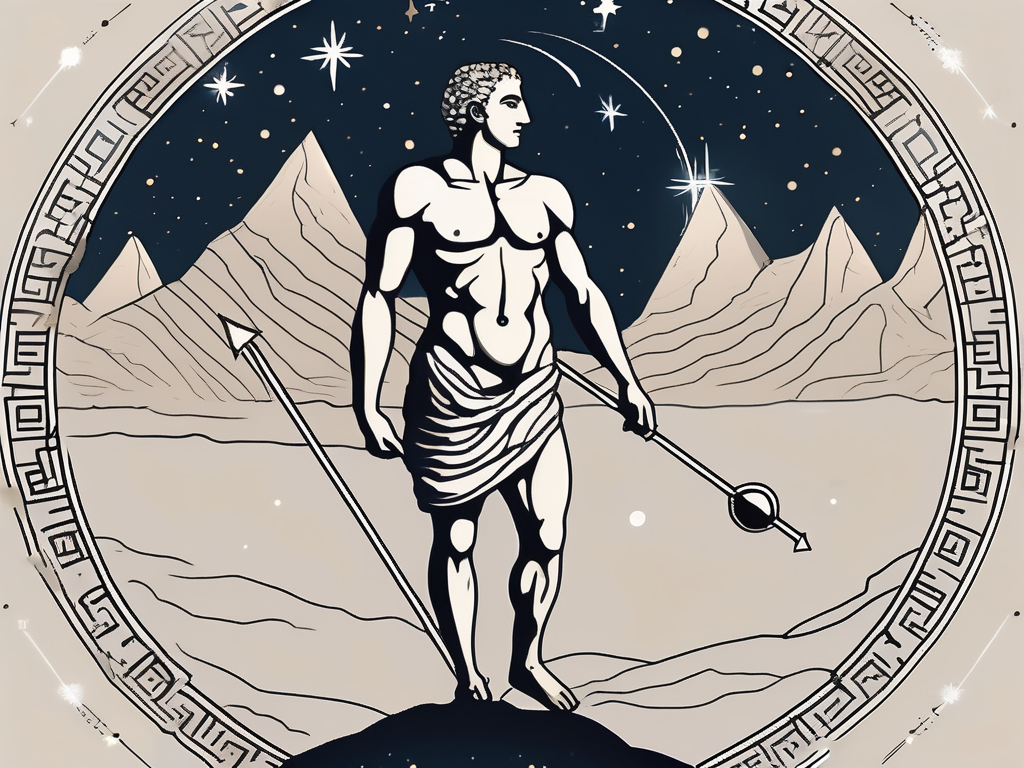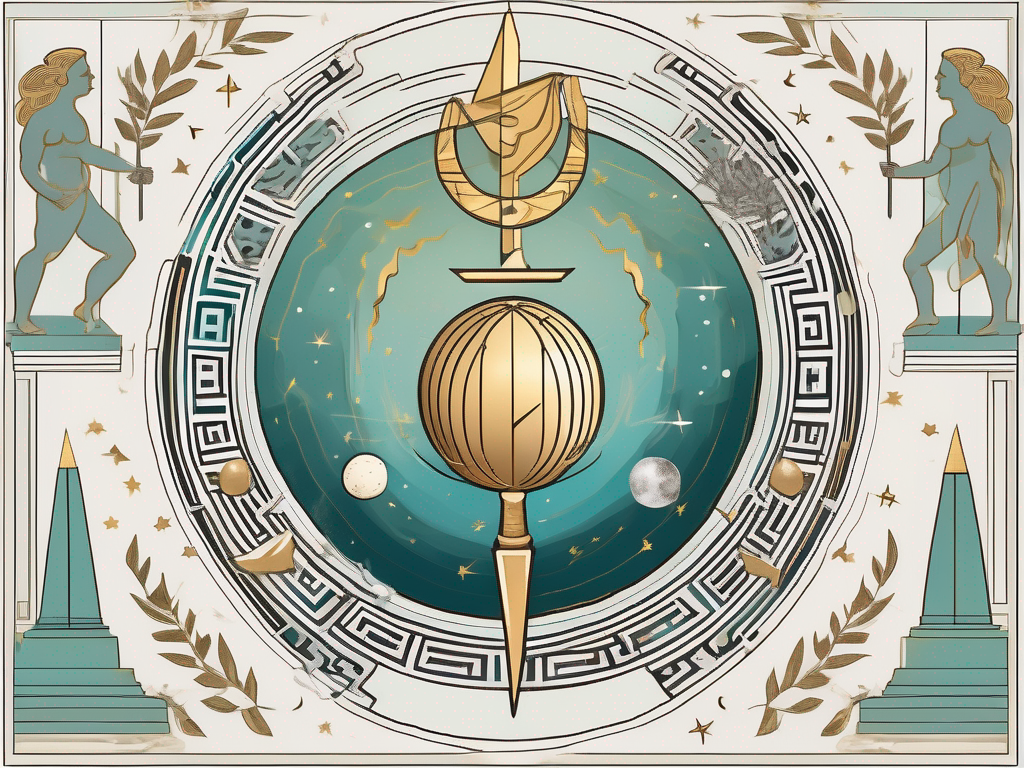In ancient Greek mythology, there are numerous gods and goddesses that captivate our imaginations. Among them is Pallas, a deity whose origins and symbolism are shrouded in mystery. Let us embark on a fascinating journey to uncover the enigmatic nature of Pallas, and its significant role in Greek culture and myth.
Understanding the Origins of Pallas
The birth of Pallas is an intriguing tale filled with divine intrigue and power struggles. According to Greek mythology, Pallas was born during the Titanomachy, a colossal battle between the Titans and the Olympian gods.
The Titanomachy was a conflict of epic proportions, with the gods and Titans clashing in a battle that shook the very foundations of the cosmos. It was a war fought not only with physical might, but also with cunning and strategy. In the midst of this chaos, Pallas emerged, a symbol of wisdom and tactical brilliance.
The Birth of Pallas in Greek Mythology
Pallas, unlike any other deity, was not born in the conventional sense. Instead, it sprang forth fully grown and fully armored from the head of Zeus. This unique birth evokes a sense of mystery and awe, as Pallas embodies not only the strength of a warrior, but also the wisdom of a sage.
Imagine the scene: Zeus, the king of the gods, in the midst of battle, his mind filled with the weight of the conflict. And then, from his head, bursts forth Pallas, a deity ready to join the fray. The sight of this divine figure, clad in gleaming armor, would have struck fear into the hearts of both gods and Titans alike.
From the moment of its creation, Pallas became an integral part of the Greek pantheon. It was revered as a symbol of strategic brilliance and was often sought after for guidance in times of war. Pallas’ birth not only marked a turning point in the Titanomachy but also solidified its place among the gods.
Pallas and the Titanomachy: A Battle of Gods
In the epic battle between the Titans and the Olympians, Pallas played a vital role as a warrior god. The gods fought relentlessly against the Titans, clashing in an epic struggle for supremacy. Pallas, with its immense strength and tactical brilliance, emerged as one of the key figures in this divine conflict.
Legends speak of Pallas leading armies of gods into battle, devising intricate strategies to outmaneuver the Titans. Its presence on the battlefield was a beacon of hope for the Olympians, inspiring them to fight with renewed vigor and determination.
But the Titanomachy was not just a physical battle; it was a clash of ideologies. The Titans represented the old order, while the Olympians symbolized a new era of gods. Pallas’ involvement in this conflict represents the eternal struggle between order and chaos, highlighting the recurring theme of battles fought for power and control.
As the war raged on, Pallas became a symbol of resilience and unwavering determination. Its strategic brilliance and unwavering loyalty to the Olympians made it a revered figure among both gods and mortals.
Even though the Titanomachy eventually came to an end with the victory of the Olympians, the legacy of Pallas lived on. Its birth and role in the conflict became a significant part of Greek mythology, reminding future generations of the power of wisdom and the importance of strategy in times of war.
The Symbolism of Pallas in Ancient Greece
In ancient Greece, Pallas carried profound symbolism that resonated with the people. It embodied both wisdom and warfare, qualities highly regarded in their society.
Pallas, also known as Pallas Athena, was a deity revered for its dual nature as a god of wisdom and war. This divine figure represented the delicate balance between intellect and strength, offering a unique perspective on the pursuit of knowledge and the art of combat.
Athena, the goddess of wisdom and strategic warfare, shared a strong connection with Pallas. Their intertwined existence emphasized the intricate relationship between these two deities, further enhancing the significance of Pallas in Greek culture.
Pallas as a Symbol of Wisdom and War
The symbolism of Pallas as a god of wisdom and war reflects the complex and multifaceted nature of human existence. In ancient Greece, wisdom was highly valued, as it represented the ability to make sound judgments and decisions. On the other hand, warfare was an integral part of Greek society, where strength and strategic thinking were essential for survival.
Pallas embodied the harmonious coexistence of these seemingly opposing qualities. It represented the ideal balance between intellectual prowess and physical might, reminding the people of the importance of both wisdom and warfare in their lives.
Through the worship of Pallas, the ancient Greeks sought to attain a higher understanding of the world and their place in it. They believed that by embracing the qualities symbolized by Pallas, they could navigate the challenges of life with wisdom and courage.
The Influence of Pallas on Greek Art and Literature
Pallas’ prominence in Greek mythology had a profound impact on the art and literature of the time. Countless sculptures, paintings, and poems depicted the god in all its majestic glory, capturing the essence of its symbolism.
The artistry of ancient Greece celebrated the divine qualities of Pallas, showcasing its wisdom, courage, and strategical brilliance. Sculptures portrayed Pallas adorned in armor, wielding a spear, and wearing a helmet, symbolizing its association with warfare. At the same time, these artistic representations also emphasized the deity’s serene and wise countenance, embodying its role as a god of wisdom.
Furthermore, Pallas’ influence extended beyond visual arts. Poets and writers drew inspiration from the rich mythology surrounding the god, exploring its many facets through their works. Epic poems, such as Homer’s “The Iliad” and “The Odyssey,” showcased the strategic brilliance of Pallas in the context of war. Other literary works delved into the god’s wisdom, celebrating its role in guiding mortals towards enlightenment and understanding.
By immortalizing Pallas in their art and literature, the ancient Greeks ensured the god’s lasting legacy in their cultural heritage. The symbolism of Pallas as a god of wisdom and war continued to inspire generations, reminding them of the importance of intellectual growth and strategic thinking in the face of adversity.
The Role of Pallas in Greek Mythology
Pallas’ role in Greek mythology extends beyond its symbolism and origin. It influenced the relationships between other gods and goddesses, shaping the intricate tapestry of Greek mythology.
But who was Pallas exactly? Pallas, also known as Pallas Athena, was a deity associated with wisdom and warfare. Its significance in Greek mythology goes beyond being just another god or goddess. Pallas played a crucial role in shaping the complex relationships and dynamics among the divine beings of ancient Greece.
Pallas and Athena: A Complex Relationship
Athena, the goddess of wisdom and warfare, shares a complex and intriguing relationship with Pallas. Some legends suggest they are one and the same, while others portray Pallas as a companion or spiritual aspect of Athena.
One interpretation suggests that Pallas was an epithet or alternate name for Athena, emphasizing different aspects of her divine nature. In this view, Pallas represents the fierce and strategic warrior side of Athena, while Athena herself embodies wisdom, intellect, and strategic thinking.
On the other hand, some myths depict Pallas as a separate entity, a close companion and confidant to Athena. Pallas is often portrayed as a wise and skilled warrior, sharing a deep bond with Athena and assisting her in battles and quests.
Regardless of the interpretation, this connection underscores the inseparable relationship between wisdom and warfare, doubling the significance of both deities. It highlights the importance of strategic thinking and intellectual prowess in times of conflict and the pursuit of power.
Pallas’ Influence on Other Greek Gods and Goddesses
Pallas’ influence extended to other gods and goddesses within the Greek pantheon. Its embodiment of strategic prowess and tactical brilliance inspired and influenced these divine beings in their own battles and quests for power.
For instance, Ares, the god of war, sought guidance and wisdom from Pallas in his relentless pursuit of conquest and victory. Pallas’ strategic insight and tactical brilliance became a source of inspiration for Ares, shaping his approach to warfare and influencing his decisions on the battlefield.
Similarly, other gods and goddesses turned to Pallas for guidance and strength in times of conflict. The likes of Hermes, Apollo, and even Zeus himself sought the wisdom and strategic counsel of Pallas, recognizing its unparalleled expertise in matters of war and strategy.
As a symbol of wisdom and war, Pallas became a role model for other deities seeking guidance and strength in times of conflict. Its influence extended far beyond its own divine realm, leaving an indelible mark on the entire Greek pantheon.
The Legacy of Pallas in Modern Culture
Even in contemporary times, Pallas continues to leave its mark on the cultural landscape. Its symbolism and mythology have transcended ancient Greece, finding resonance in literature, film, and popular culture.
Pallas in Contemporary Literature and Film
Many modern authors and filmmakers draw inspiration from Greek mythology, including the enigmatic figure of Pallas. The god’s deep symbolism and intriguing backstory make it a compelling character in novels, movies, and television shows.
These adaptations serve as a reminder of the enduring appeal of Greek mythology and its ability to capture our imagination across different mediums.
The Enduring Symbolism of Pallas Today
Furthermore, Pallas’ symbolism continues to hold relevance in our ever-changing world. The balance between wisdom and warfare remains a vital concept, reminding us of the delicate equilibrium required to navigate the complexities of life.
Whether it’s in the pursuit of knowledge or the challenges we face in conflict, the lessons embodied by Pallas endure, offering guidance and understanding in our modern lives.
In conclusion, Pallas, the enigmatic Greek god, has left an indelible mark on mythology, art, and literature. From its mysterious birth to its profound symbolism, Pallas encapsulates the duality of wisdom and war. Its influence reaches far beyond ancient Greece, continuing to inspire and engage us in contemporary times. So, let us delve deeper into the world of Pallas, and uncover the hidden truths and enduring legacy of this captivating deity.












